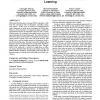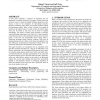56 search results - page 11 / 12 » An Automated Framework for Structural Test-Data Generation |
NOMS
2002
IEEE
13 years 10 months ago
2002
IEEE
The management of policies in large-scale systems is complex because of the potentially large number of policies and administrators, as well as the diverse types of information th...
SP
1998
IEEE
13 years 9 months ago
1998
IEEE
A strand is a sequence of events; it represents either the execution of legitimate party in a security protocol or else a sequence of actions by a penetrator. A strand space is a ...
ATAL
2009
Springer
13 years 12 months ago
2009
Springer
Multi-Agent Reinforcement Learning (MARL) algorithms suffer from slow convergence and even divergence, especially in largescale systems. In this work, we develop an organization-b...
ATAL
2005
Springer
13 years 11 months ago
2005
Springer
The next generation of air traffic control will require automated decision support systems in order to meet safety, reliability, flexibility, and robustness demands in an environ...
ACMSE
2006
ACM
13 years 7 months ago
2006
ACM
A code clone represents a sequence of statements that are duplicated in multiple locations of a program. Clones often arise in source code as a result of multiple cut/paste operat...


